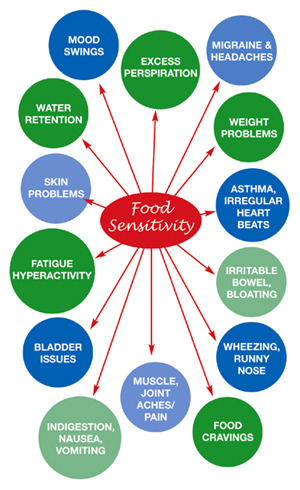Food sensitivities and intolerances are becoming an increasing problem. It is estimated that 70-80% of the population have food sensitivities. Food sensitivities are different from food allergies, which affect about only 4% of the population. Food sensitivities, unlike food allergies which occur immediately after consumption of the offending food, can cause delayed reactions because the symptoms that they cause can take several hours to several days (up to 96 hours) to appear, which makes it difficult to identify the offending food or substance. The most common food sensitivities are to: wheat / gluten, dairy, soy, eggs, citrus, beef, pork and corn. Food sensitivities can be the cause of many symptoms and it is important to discover which foods you may be reacting to.
Possible Food Sensitivity Symptoms
Head: Chronic headaches, migraines, dizziness, difficulty sleeping
Mouth and throat: Coughing, sore throat, hoarseness, swelling or pain, gagging, frequent clearing of the throat, sores on the lips, tongue or gums
Eyes, ears, nose: Runny/ stuffy nose, post nasal drip, ringing in the ears, blurred vision, sinus problems, watery and itchy eyes, ear infections, hearing loss, sneezing attacks, hayfever, excessive mucus, dark circles under the eyes, swollen, red or sticky eyelids
Heart and lungs: Irregular/ rapid heartneat, asthma, chest pain and congestion, bronchitis, shortness of breath, difficulty breathing
Gastrointestinal tract: Nausea and vomiting, constipation, diarrhea, irritable bowel syndrome, indigestion, bloating, gas, cramping, stomach pain, ulcers, GERD, heartburn
Skin: Hives, rashes, psoriasis, dry skin, excessive sweating, acne, hair loss
Muscles and joints: General weakness, muscle/ joint aches and pains, arthritis, swelling, stiffness
Energy and activity: Fatigue, mental dullness, difficulty concentrating, apathy, hyperactivity, restlessness
Emotions and mind: Mood swings, anxiety and tension, fear, nervousness, anger, irritability, aggressive behavior, binge eating or drinking, food cravings, depression, confusion, poor comprehension, poor concentration, difficulty learning
Other: Over/underweight, fluid retention, insomnia, genital itch, frequent urination, bed-wetting
Food Sensitivity Testing
There are several different types of food sensitivity testing. Some labs measure inflammatory markers while others will test for specific antibodies. At our office, we offer the ALCAT (Antigen Leukocyte Cellular Antibody Test) food sensitivity test. The ALCAT Test identifies cellular reactions to over 350 foods, chemicals and herbs. These inflammatory reactions are linked to chronic health problems like obesity and diabetes, as well as skin, heart, joint, and digestive disorders. For more information about the ALCAT test, please visit www.alcat.com.
For more information about food sensitivity testing, please call our office at 814-720-4825.


